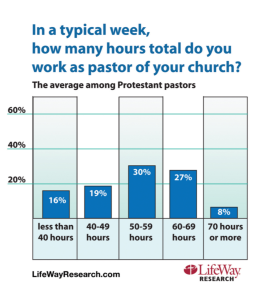Six Ways Pastors Can Find Work Balance

Sam Rainer

Most pastors work long hours. Most pastors work hard for their churches. In a LifeWay Research survey of 1,000 pastors, 65% of pastors indicated they worked 50 or more hours per week. The median amount of hours worked by a senior pastor is 55 hours per week. Pastors are a notorious bunch when it comes to work. The ministry tends to attract two types: lazy bums and workaholics. This post is more for the workaholics. How can a pastor find work balance?
- Plan the church year, then plan your week. A schedule facilitates both a plan and a vision. Your church schedule in any given year is a roadmap of discipleship. Plan church events, sermon series, and programs one year out, then plan your week around the annual church calendar. Every Sunday evening or Monday morning, spend 30 minutes refining your weekly schedule. Keeping a schedule is one of the best ways to increase productivity with fewer hours.
- Take your weekend every other week. The five-day workweek is a recent phenomenon. The first five-day workweek was instituted in 1908 by a New England cotton mill to accommodate Jewish workers who wanted off on Saturday. In 1926, Henry Ford started letting his factory workers off for both Saturday and Sunday. The two-day weekend didn’t catch nationally until 1940, when the Fair Labor Standards Act mandated a 40-hour workweek. The Bible calls for a day of rest—one day, not two. One way to control work hours is to work a six-day week every other week. Rather than cramming a lot of work into five days, spread it out over six days. Also, pastors should count Sunday as a day of work, not rest.
- Build interruptions into your schedule. The work of a pastor is often disjointed. Pastors get a lot of interruptions during the day. So plan for them. As you schedule your week, build into each workday about 30-60 minutes of “interruption time.” If the interruption doesn’t occur that day, then leave a little earlier and surprise your family by being home.
- Identify time abusers. This one should be relatively easy. Block trolls on social media. Block the number of a person who calls your cell phone incessantly. Let people know you will only do a set amount of counseling before handing them off to a professional. Set an email filter for the person who includes you on all those forwards.
- Create systems of care. One requirement of pastoral ministry can take up more time than any other: pastoral care. A hospital visit can take half a day, especially if the hospital is not located near the church. A short phone call is rare in ministry. Most people enjoy talking to their pastor. The role of a pastor includes congregational care, but it doesn’t mean the pastor must do it all. Assign a day of the week to each staff person or a deacon for hospital visits. Use your schedule to create natural breaks, like making appointments one hour before a Wednesday night service. Set limits on how far you will travel to see a church member (and remember, you can always make exceptions if needed). Create a system of care rather than attempting to do it all.
- Get regular rest and exercise. You’ll be surprised at how much energy you have and how productive you are if you simply get rest and exercise. Sleep at least seven hours each night. Playing catch-up with sleep on the weekends does not work. Exercise at least three times a week. Schedule both your rest and your exercise and make them a mandatory part of your calendar.
Work hard for your church. It’s biblical! But you cannot minister effectively if you’re fried. Most pastors struggle with balance. The ministry has far too many lazy bums and workaholics. Pastors should model spiritual disciplines for their churches. Work balance is a key part of living in a way that glorifies God.
This post is an excerpt from a research article I wrote for Church Answers Monthly. It’s part of a premier coaching ministry with Thom Rainer.







We are to make disciples. That means to teach them. The only way that we teach anyone anything is by example. A pastor who does too much sets the wrong example for his people and weakens them. If God had to take a day off, how much more we as ministers?
The minister who works too much has an unresolved issue, he/she is trying to prove something or to win someone’s approval. Maybe he/she just doesn’t know better but that is a rare case.
I loved your article.
Thanks Dixon!
keeping a schedule,
thank you very much